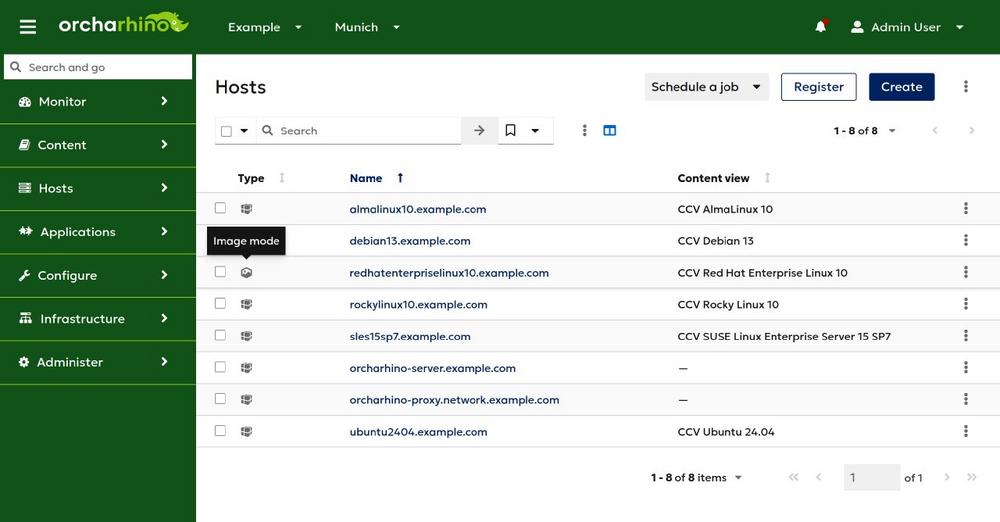ATIX AG releases orcharhino 7.4 with new clients, expanded content filters, and Image Mode Hosts


New clients for Oracle Linux, Debian, and SLES
The list of supported clients has been expanded with orcharhino 7.4. Oracle Linux 10 (x86_64, arm64), Debian 13 (x86_64), and SLES 15 SP7 (x86_64, arm64, PowerPC) can now be managed in orcharhino
‚Image Mode Hosts‘: Integration of containers and classic hosts
A key new feature is support for Image Mode Hosts. This allows OCI-compliant images to be imported and registered in orcharhino. This makes it possible to manage containers and classic "Package Mode Hosts" together within a single tool.
Extended content filters for Debian and Ubuntu
The Content View Filters have been extended to include package version filters for Debian and Ubuntu. This allows you to control which packages and package versions – and thus also derived errata – are available for hosts. In this way, unsuitable or company-wide prohibited packages can be reliably excluded.
Security improvement: Secure Boot for vSphere and libvirt
With orcharhino 7.4, hosts based on vSphere and libvirt can now be deployed with Secure Boot enabled. This ensures that only unmodified code is started, which protects the environment from manipulation and malware.
Rolling Content Views controllable via Ansible
Support for Rolling Content Views has been extended and can now also be controlled via Ansible modules. This enables deeper integration into existing automation processes and easier management of Content Views via remote management.
Flatpak support
Version 7.4 introduces support for OCI-compliant Flatpaks. This allows Flatpak repositories to be integrated and managed in orcharhino. Further information is also available at docs.orcharhino.com
Preview of upcoming featuresAnsible integration
The orcharhino team is working on deeper integration of Ansible. Plans include the integration of Git repositories for Ansible roles, the integration of Ansible Execution Environments, and lifecycle management for Ansible roles. The goal is to map not only packages but also roles and collections in staging processes, thereby meeting the increased requirements for the organization of Ansible content.
New compute resources via openTOFU
At the same time, work is underway to expand compute resource support. The openTOFU framework (open source fork of Terraform) will make it easier to integrate additional providers, such as Nutanix, in the future. Instead of complex plugins, small connectors will suffice to make new resources available more quickly.
Further informations on orcharhino 7.4:
About orcharhino
orcharhino is the comprehensive solution for automating and orchestrating IT infrastructures. The enterprise open source solution can be used in Windows and Linux environments and enables automated deployment, configuration, and lifecycle management as well as release and patch management. orcharhino can be operated on-premises as well as in the cloud.
Developed by ATIX AG as an open source product for businesses, orcharhino offers organizations of all sizes maximum flexibility, efficiency, and control—backed by a strong partner network and professional support.
For more information, visit www.orcharhino.com.
ATIX AG is a leading provider of solutions for enterprise IT infrastructures, enabling efficient, scalable, and flexible system management. ATIX AG operates an ISO9001:2015-certified quality management system for the development, support, consulting, and training of software solutions.
ATIX AG
Parkring 15
85748 Garching bei München
Telefon: +49 89 4523538-0
Telefax: +49 (89) 4523538-290
http://www.atix.de/
![]()